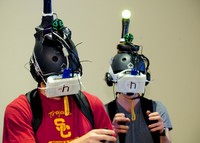Friday, February 15, 2013
A Glimpse Into the Future of Tech at USC

How do you get technology developed by researchers deep within a university, and make that visible to to the public? GLIMPSE, a digital technology showcase featuring cutting-edge research from across the university, was held at The University of Southern California (USC) in January, to do exactly that--help bring the research conducted at the school to light.
Attendees watched presentations from a number of USC schools and centers. Paul Debevec, winner of a Scientific and Engineering Academy Award for his work in rendering digital faces, presented on the USC Institute for Creative Technologies' (ICT) latest innovations. The highlight was the Light Stage system, which uses specialized algorithms to perfectly reproduce an actor's appearance and movements digitally.
Stephen Smith, executive director of the Shoah Foundation, demonstrated New Dimensions in Testimony, a collaborative project with ICT to capture stories from Holocaust survivors. By combining new interview content with advanced filming, voice-recognition processing, and display technologies, New Dimensions in Testimony will allow students to engage in dialogue with virtual survivors for years to come.
Other presentations include work on games from the Game Innovation Lab, a Twitter sentiment analysis project from the Annenberg Innovation named Sentimeter and, finally, the Integrated Media Systems Center will present on the growing field of geo-crowdsourcing.
The day ended with live demonstrations of technologies discussed during the event, as well as additional projects under development at USC.
Project Holodeck, a part of the USC Games live and hands on demonstrations demonstrated the potential for virtual reality games and experiences right on our smart phones and tablets.
With specially designed eyewear mounted to an iPhone or an iPad, the user is transported directly into the game. It makes for a surprisingly immersive experience. Further refinement of the design could yield new horizons in the mobile games market.
Another standout was the Emergent Leader Immersive Training Environment. ELITE is currently being used by the military to train its young officers. In 2012, The Army used the software to help train over 1,100 Soldiers at Fort Benning. The experience incorporates a virtual human, classroom response technology and real-time data tracking tools to support the instruction, practice and assessment of interpersonal communication skills. While currently ELITE has been built for the Army's purposes, It's easy to see how ELITE may very well be the future of in home-based instruction.
"USC's strength in digital technology includes the collaboration between the arts and engineering, and technology and storytelling, that makes possible a conversation with the avatar of a real witness to history, the recreation of digital actors indistinguishable from their human counterparts, and the development of interactive adventures whose impact on behavior earns them the title of serious games," explained Randolph Hall, Vice President of Research at USC.
(Image Courtesy of USC News)